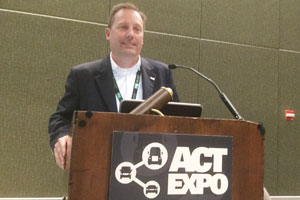Technology Adoption Boosts Fleets’ Efficiency to 7 MPG, NACFE Says

DALLAS — Use of a variety of technologies to boost fleets’ fuel efficiency helped increase mileage for 14 major nationwide carriers to 7 mpg last year, well over the national average, according to the North American Council for Freight Efficiency.
“What we know is their adoption of these technologies has grown a good bit over the past 12 years,” Mike Roeth, NACFE’s executive director, said at the opening of the 2015 ACT Expo here, where the group held a trucking-efficiency workshop as the show opened May 4.
NACFE’s annual study, more of which will be released later this week at ACT Expo, looked at the 68 fuel-efficiency technologies used by 14 major fleets. The group tracks the fleets’ fuel-efficiency efforts dating to 2003.
Had the fleets not adopted an array of technologies, their average would have been 6.1 mpg, Roeth told Transport Topics, adding that the national industrywide average was 5.9 mpg last year.
At the May 4 workshop, more than 100 participants broke into small working groups — which Roeth described as “speed-dating for efficiency technologies” — and use of technologies including everything from auxiliary power units to automated manual transmissions and power systems fueled by natural gas as well as diesel.
Carriers in NACFE’s ongoing study include Ryder System’s dedicated fleet, UPS Inc., Werner Enterprises, Crete Carrier, Prime Inc., C.R. England, Schneider and private carrier Frito-Lay, which has adopted extensive use of compressed natural gas in its heavy-duty trucks.
ACT Expo will include a session May 5 on trucking efficiency and advanced technologies, and NACFE will hold a press conference and host a three-hour trucking-efficiency summit May 6.

